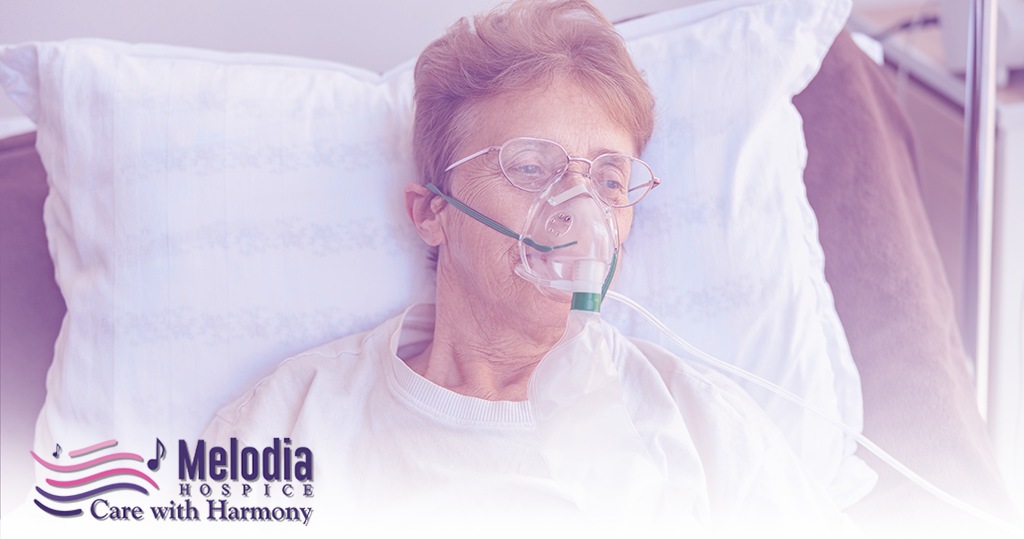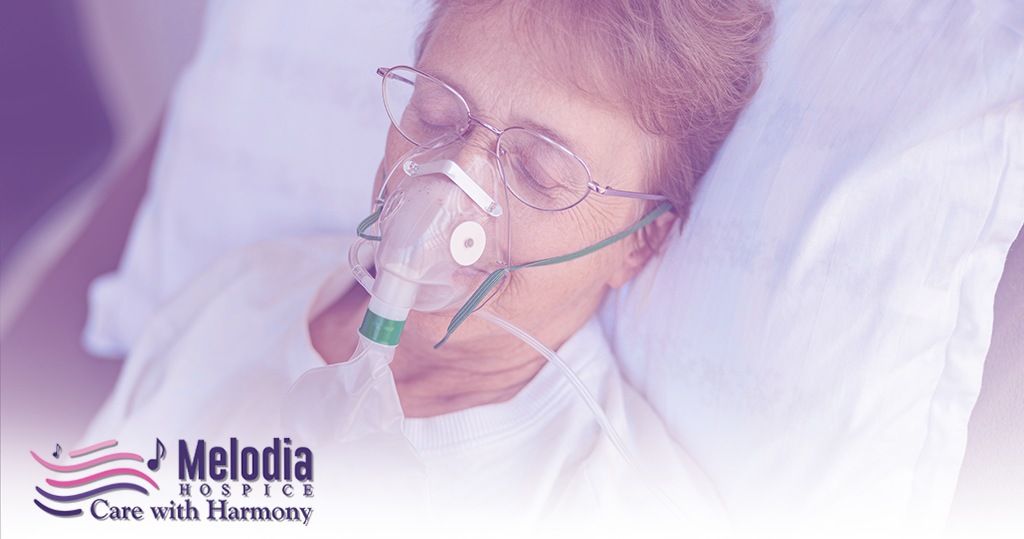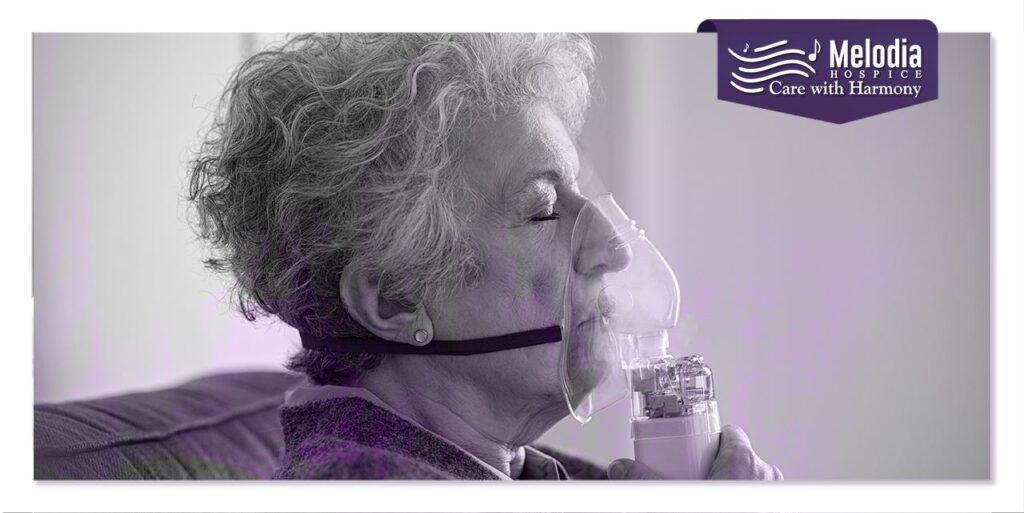Who do you belong to the patient, the carer, or the family? Find out how Melodia Care hospice can help patients who are suffering from COPD and other types of lung disease in their advanced stages.
Criteria for admission to a hospice care facility for chronic obstructive pulmonary disease or other lung disease are as follows:

- Symptoms include shortness of breath whether at rest or with even mild exercise when getting oxygen therapy
- Dyspnea that does not respond to treatment with bronchodilators, or that only responds in part to treatment
- Development of chronic pulmonary illness as demonstrated by one or more of the following symptoms or signs
- Frequent use of medical services, such as hospitalizations, visits the emergency room, and/or visits to physicians for outpatient care as a result of symptoms of pulmonary disease
- Recurrent bouts of bronchitis or pneumonia
- 10% of total body weight lost through no deliberate effort over the course of the prior six months
- The gradual inability to execute various activities of daily living (ADLs) independently or the growing dependence on ADLs, of which result in a gradually declining performance status
Other Critical Factors to Consider
- Pulmonary Cor
- Chronic continuous oxygen therapy
- Steroid-dependent
- Cyanosis
- Abnormal laboratory results
- FEV1 30% predicted post-bronchodilator
- For several years, there was a decline of at least 40 mL/year in FEV1.
- On room air, PO2 55
- On room air, O2 saturation was 88 percent.
- PCO2 persistent hypercarbia (50 mm HG)
These guidelines are made accessible to Melodia Care hospice patients and families as a useful resource. They are not meant to serve as a substitute for the professional judgment of a physician. What are the requirements for admission to a hospice for pulmonary fibrosis?
Hospice Clinical Eligibility Criteria for Advanced COPD and Other Lung Diseases

Clinical guidelines may be utilized by medical professionals in order to determine which patients are in their final six months of lung disease. When it comes to end-of-life care, patients should be at a point in their lives when they are medically and mentally ready for hospice.
Patients who qualify for hospice care typically include those in the following situations:

- They have progressed to the point where most of their days are spent inside the house.
- Have gone to the emergency room more than once (at least once every three months) because of infection or bouts of respiratory failure
- Have been admitted to the hospital more than once (at least once per three months), and I no longer wish to be admitted. I also do not wish to be intubated at this time.
- Melodia Care hospice provides patients and their families with guidance regarding their desired outcomes and alternate approaches to the management of symptoms, with the end objective of preventing unneeded hospitalization and the insertion of a breathing tube.
Chronic, life-threatening lung disorders that are not cancer are divided into the following categories:

- Chronic obstructive pulmonary disease (COPD)
- Emphysema
- Bronchitis is chronic
- Chronic asthma
- Bronchiectasis
- Fibrosis of the lungs
- Cystic fibrosis (CF)
- End-stage tuberculosis
Care for Patients with Advanced Lung Diseases, Including Chronic Obstructive Pulmonary Disease

Patients often report that dyspnea and the anxiety that goes along with it are two of the most upsetting symptoms they face. It is common practice to treat these with a combination of therapeutic therapy and the individualized care and assistance that is offered around the clock by hospice. The following elements are included in the care plan for lung disease at the end of life offered by Melodia Care hospice:
- A full examination by the entire interdisciplinary team
- The requirements and goals of the patient are taken into consideration during the pre-emergency care planning process.
- Interventions, both pharmacologic and nonpharmacologic, with the goal of lowering the frequency of episodes of respiratory distress
- After the initial signs of respiratory distress have been detected, a specialized emergency protocol is implemented to offer a response within 24 hours.
- The patient’s overall quality of life was the primary focus of the caregivers’ efforts.
Death From Pulmonary Fibrosis What to Expect

The mere thought of passing away or dying can be painful, but if you talk to your loved ones and friends about how you’re feeling about the situation, it may seem less overwhelming. Patients suffering from pulmonary fibrosis should receive hospice care as soon as possible.
Everyone is different, but as you become older, it is likely that your lung function may decrease, and you may find that you need oxygen to help you breathe. It is possible that you will have increased fatigue as well as difficulties breathing as the pulmonary fibrosis continues to grow.
Signs Of Death

It is likely that you may feel the need to spend more time in bed as a result of the reduction in lung function that you are experiencing. When you get close to the end of the chapter, you could notice that you start to nod off or perhaps fall asleep for extended periods of time.
It’s probable that your loss of interest in drinking and eating will occur simultaneously. It is possible that your breathing rhythm will change, which may cause your skin to turn grey and sticky, and you may feel as though you have no energy at all. This is one of the symptoms that may accompany this transformation.
It is essential that you give some consideration to end-of-life care at some point. The fact that this helps you control your physical symptoms while also providing emotional support for you and your family is something that a lot of patients find to be extremely beneficial. This is something that a lot of patients find to be extremely beneficial. End-of-life care can be provided in a variety of settings, including your own home, a hospital, a care home or nursing home, or a hospice. If you or a loved one are in need of this type of care, there are many options available to you.
Care For The Dying

It is possible that you and your family will need to make some changes to the way things are done around the house in order for you to receive care or die away in the comfort of your own home. You have the choice to have specific equipment in your residences, such as a ramp, stairlift, or oxygen tank installed if you require it. In addition to the provision of medical hardware, those who are diagnosed with pulmonary fibrosis are offered financial assistance in the form of awards.
When it comes to eating or using the restroom, you could also require assistance from a registered nurse. You can seek the counsel of the palliative care team that you are currently working with or of a hospice for assistance in this matter.
Making Your Desires a Reality

Having the knowledge that your loved ones have granted your wishes can be an extremely empowering experience. You can express your desires for care at the end of life and after death in a number of different documents, including the following:
- Using a piece of legal paperwork known as a “lasting power of attorney,” you have the ability to name one or more people (who are collectively referred to as “attorneys”) to assist you in making decisions or to make decisions on your behalf if you are unable to do so on your own. This authorization can be given to any number of people.
- An advanced care plan is a legal document that allows you to specify how you want to be cared for in the event that you become unable to make those decisions for yourself in the future. You should probably include specifics regarding the location where you want to die away as well as the individuals that you want to be there with you when you do.
- An advanced decision is a document that can be legally enforceable and that defines your preferences for any future medical treatment that you may require. This document is also frequently referred to as a living will. These preferences can include the question of whether or not you wish to participate in therapy that has the potential to save your life.
- Following your death, your will specifies who should get your money, property, and any other possessions. You shouldn’t put off writing a will any longer if you want to make adjustments to an existing will or if you haven’t written one yet but plan to in the near future. Make sure that the people you care about are aware of the area where it can be found. Check on them.
- Your last wishes, such as whether you want to be cremated or buried, the people who will attend your funeral, the music and readings that will be played, and even the flowers that will be present can all be a part of your funeral plan.
Patients with pulmonary fibrosis receive the highest quality of care from Melodia Care hospice. For the very best services in hospice care, you may get in touch with Melodia Care hospice. Please call us at 1- 888 635-6347 if you have any questions.










